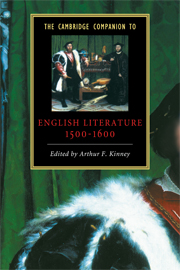Book contents
- Frontmatter
- 1 Introduction
- 2 The sixteenth century
- 3 Tudor aesthetics
- 4 Authorship and the material conditions of writing
- 5 Poetry, patronage, and the court
- 6 Religious writing
- 7 Dramatic experiments
- 8 Dramatic achievements
- 9 Lyric forms
- 10 Narrative, romance, and epic
- 11 The evolution of Tudor satire
- 12 Chronicles of private life
- 13 Popular culture in print
- 14 Rewriting the world, rewriting the body
- 15 Writing empire and nation
- Index
4 - Authorship and the material conditions of writing
Published online by Cambridge University Press: 28 May 2006
- Frontmatter
- 1 Introduction
- 2 The sixteenth century
- 3 Tudor aesthetics
- 4 Authorship and the material conditions of writing
- 5 Poetry, patronage, and the court
- 6 Religious writing
- 7 Dramatic experiments
- 8 Dramatic achievements
- 9 Lyric forms
- 10 Narrative, romance, and epic
- 11 The evolution of Tudor satire
- 12 Chronicles of private life
- 13 Popular culture in print
- 14 Rewriting the world, rewriting the body
- 15 Writing empire and nation
- Index
Summary
'We should note the force, effect, and consequences of inventions which are nowhere more conspicuous than in those three which were unknown to the ancients, namely, printing, gunpowder, and the compass. For these three have changed the appearance and state of the whole world'. Francis Bacon, Novutn Organum To grasp the conditions of writing in the early English Renaissance, we need to imagine a world poised between manuscript and print cultures. Although William Caxton set up the first press in England in 1476 and set into motion a slowly unfolding debate about the meaning and significance of print technology, a lively manuscript culture continued to thrive alongside the print marketplace for the next hundred years or more. The result is a fascinating cross-fertilization between two kinds of textual production, each with its own practices and forms. In turn, these new forms of production gave rise to new conceptions of authorship and meaning. It is impossible “to divorce the substance of a text on the one hand,” observes D. F. McKenzie, “from the physical form of its presentation on the other.”
- Type
- Chapter
- Information
- The Cambridge Companion to English Literature, 1500–1600 , pp. 64 - 89Publisher: Cambridge University PressPrint publication year: 1999



